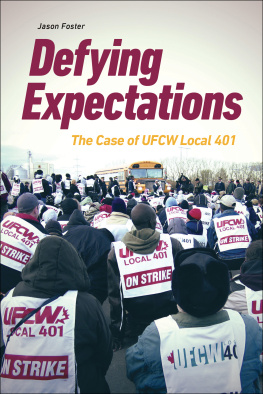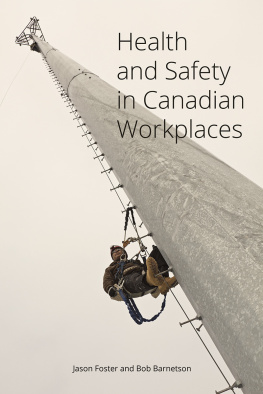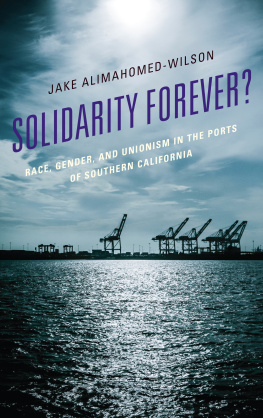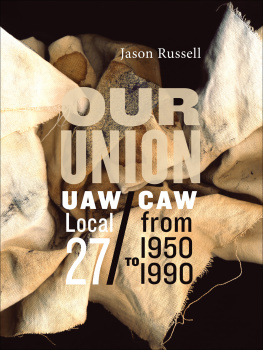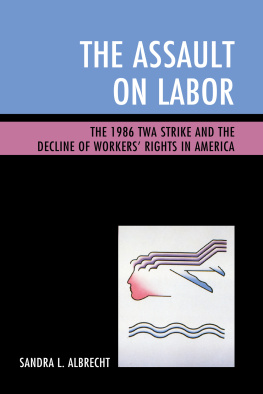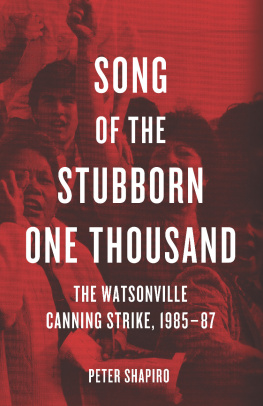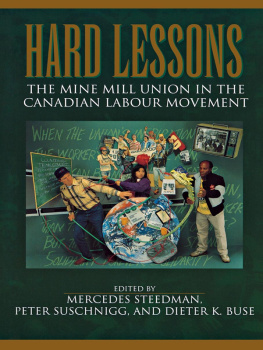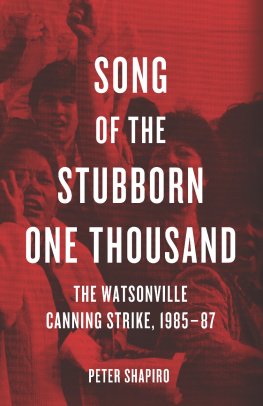Defying ExpectationsWorking Canadians: Books from the CCLH
Series editors: Alvin Finkel and Greg Kealey
Labour activism has a long and powerful history in Canada. Since 1976, the Canadian Committee on Labour History has published Labour/Le Travail, Canadas pre-eminent scholarly journal of labour studies. Working Canadians: Books from the CCLH, published in conjunction with AU Press, likewise focuses on the lives and struggles of Canadas working people, past and present, and on the unions and other organizations that workers founded to represent their interests. The series specifically seeks to counter the notion that labour history is first and foremost an academic discipline, dominated by a relatively small and self-selected group of specialists. The books in the series accordingly span a wide range of genresfrom oral histories, autobiographies, and memoir to works that document local and provincial labour movements to secondary analyses founded on careful research but written in a down-to-earth style. Underlying the series is the recognition that anyone who labours on behalf of another is a working person, and that, as working people, we continually participate in creating our own history. That history, which stands as a tribute to our collective strength, should not be solely an object of academic scrutiny. Rather, it is living part of our identity as working people and should be readily accessible to all.
Series Titles
Champagne and Meatballs: Adventures of a Canadian Communist
Bert Whyte, edited and with an introduction by Larry Hannant
Union Power: Solidarity and Struggle in Niagara
Carmela Patrias and Larry Savage
Working People in Alberta: A History
Alvin Finkel, with contributions by Jason Foster, Winston Gereluk, Jennifer Kelly and Dan Cui, James Muir, Joan Schiebelbein, Jim Selby, and Eric Strikwerda
Provincial Solidarities: A History of the New Brunswick Federation of Labour
David Frank
Solidarits provinciales: Histoire de la Fdration des travailleurs et travailleuses du Nouveau-Brunswick
David Frank, traduit par Rjean Ouellette
The Wages of Relief: Cities and the Unemployed in Prairie Canada, 192939
Eric Strikwerda
Defying Expectations: The Case of UFCW Local 401
Jason Foster
Defying Expectations
The Case of UFCW Local 401
Jason Foster
Copyright 2018 Jason Foster
Published by AU Press, Athabasca University
1200, 10011 109 Street, Edmonton, AB T5J 3S8
ISBN 978-1-77199-199-5 (pbk.) ISBN 978-177199-200-8 (PDF)
ISBN 978-1-77199-201-5 (epub) doi: 10.15215/aupress/9781771991995.01
Cover and interior design by Sergiy Kozakov
Printed and bound in Canada by Marquis Book Printers
Library and Archives Canada Cataloguing in Publication
Foster, Jason, 1970-, author
Defying expectations : the case of UFCW Local 401 / Jason Foster.
(Working Canadians : books from the CCLH )
Includes bibliographical references and index.
Issued in print and electronic formats.
Co-published by Canadian Committee on Labour History.
1. United Food and Commercial Workers Canada. Local 401. 2. Labor union localsAlbertaCase studies. 3. Strikes and lockoutsFood industry and tradeAlbertaCase studies. 4. Labor union membersAlbertaCase studies. I. Canadian Committee on Labour History, issuing body II. Title. III. Series: Working Canadians (Edmonton, Alta.)
HD8109.A42F67 2017 331.80971234 C2017-906951-9
C2017-906952-7
We acknowledge the financial support of the Government of Canada through the Canada Book Fund (CBF) for our publishing activities and the assistance provided by the Government of Alberta through the Alberta Media Fund.
Please contact AU Press, Athabasca University at for permissions and copyright information.
Contents
Acknowledgements
A book is the result of many peoples contributions. This book was a work in progress for a long time, and I owe a debt of gratitude to those who helped it take shape. I must begin by thanking the members, staff, and elected officials of United Food and Commercial Workers Local 401 for opening up their union to mefor allowing me to attend meetings and other events and for agreeing to take part in interviews. For reasons of confidentiality, apart from Doug OHalloran, Theresa McLaren, and Tom Hesse, I am unable to name the many people who offered their time, energy, and insights, but please know that I am very grateful. I have tried to tell your stories as best I can.
I also wish to thank the many brothers and sisters in the labour movement with whom I have joined in the struggle for workers rights over the years. They inspired me, and their example motivated me to study unions and how they operate. Simply put, the better we understand unions, the more effective we will be at defending workers.
Judy Haiven was an early and passionate advocate for this project and guided me through the challenging days of putting it all together in its first form as my dissertation. I recognize how fortunate I was to have a supervisor as caring and committed as Judy. My heartfelt thanks as well to the dedicated group of scholars who appropriately put my ideas through the wringer: Larry Haiven, Val Marie Johnson, Charlotte Yates, and Gregor Murray. I also gratefully acknowledge the contributions of Albert Mills to some of the theoretical underpinnings of the book.
I would be remiss to not mention my colleague, friend, and partner in (academic) crime, Bob Barnetson. Ever the willing sounding board, he helped me process my half-worked-out thoughts and put up with my inevitable complaining about how hard it actually is to write a book. I also thank the editors and staff at AU Press. Thanks to their hard work, this book is much stronger than it would have been in the hands of less committed professionals.
The last word I keep for my family. I have felt their love and support throughout this adventure. It cant be easy putting up with someone who is intent on producing a book. The dinner conversations hijacked by the need to mull over a new idea. The countless hours holed up in the basement office. I want them to know that their never-ending love and support carried me through this project.
Defying ExpectationsIntroduction
In October 2005, I spent a day walking the Lakeside Packers picket line. The beef-processing plant was in the midst of an ugly first-contract strike. During my tenure as a staff member for the Alberta Federation of Labour (AFL), I had walked my fair share of picket lines. In my experience, they are mostly the same: workers milling about, chatting idly among themselves, stopping vehicles and pedestrians to explain the dispute, and occasionally rallying to stop strikebreakers from crossing the line. In the world of modern labour relations, the angry energy once associated with strikes has largely been drowned in a sea of legal restrictions. Laws governing picket lines, intrusive video surveillance (practiced by both sides), and labour board injunctions generally serve to keep expressions of outrage and protest in check. More the stuff of monotony than excitement, the modern picket line resembles its early-twentieth-century ancestor only in the presence of picket signs.

